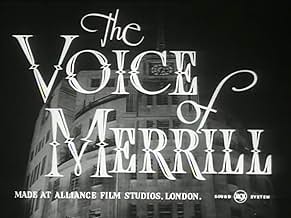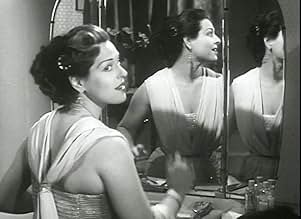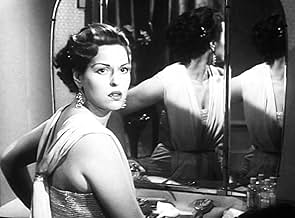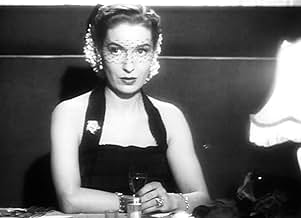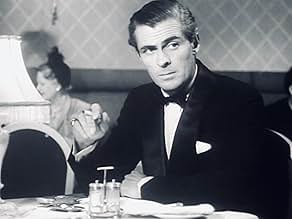Quattro persone sono coinvolte nell'omicidio di una donna ricattatrice, uno editore, uno scrittore emergente, un altro affermato brillante scrittore e sua moglie.Quattro persone sono coinvolte nell'omicidio di una donna ricattatrice, uno editore, uno scrittore emergente, un altro affermato brillante scrittore e sua moglie.Quattro persone sono coinvolte nell'omicidio di una donna ricattatrice, uno editore, uno scrittore emergente, un altro affermato brillante scrittore e sua moglie.
- Regia
- Sceneggiatura
- Star
Arnold Bell
- Director of Stage Play
- (non citato nei titoli originali)
Alex Graham
- Wine Waiter
- (non citato nei titoli originali)
Victor Harrington
- Flamenco Club Patron
- (non citato nei titoli originali)
Aileen Lewis
- Flamenco Club Patron
- (non citato nei titoli originali)
Alvar Liddell
- BBC Continuity Announcer
- (non citato nei titoli originali)
Pat Ryan
- Flamenco Club Patron
- (non citato nei titoli originali)
Tim Turner
- Bannister
- (non citato nei titoli originali)
Ben Williams
- Accident Car Driver
- (non citato nei titoli originali)
Recensioni in evidenza
"The Voice Of Merrill" aka "Murder Will Out" (1952) is the kind of film best watched on a cold day under warm covers. It doesn't attempt any major filmmaking innovations, but it is a solid example of what is often affectionately called the "cozy" British whodunit. Actually, it begins as a whodunit, but develops into a new when-will-it-be-done tale involving some of the main suspects, until both plot threads get tied up at the end. James Robertson Justice steals the show as a sharp-tongued author. Overall, it's familiar material well-done; only the very ending is slightly too abrupt. *** out of 4.
A female blackmailer is murdered, and three suspects emerge in "The Voice of Merrill," known in the US as "Murder Will Out."
Publisher Parker (Henry Kendall), up-and-coming writer Hugh (Edward Underdown), and Jonathan (James Robertson Justice) are the three who may have been involved in her murder.
Jonathan is married to Alycia (Valerie Hobson), but the marriage is not a happy one. She meets Hugh, and they fall in love. Hugh was due to meet the victim for dinner the night she was killed.
Ambitious for Hugh, Alycia organizes a radio series of her husband's old stories. The show is called The Voice of Merrill. It becomes extremely popular, with people wondering about the identity of the voice.
Alycia wants to tell the press that the writer of the stories is actually Hugh and not her husband. Jonathon has a severe heart problem and not expected to live. He never cared about claiming authorship of the stories. However, seeing the show's success, he decides to make trouble. The last story in the series, still allegedly written by Hugh, is a pip!
The murder of the blackmailer is revealed, but it's actually secondary to the triangle of Jonathan-Alycia-Hugh. There's a twist at the end of the film.
This is a little long and draggy, but Robertson Justice and Hobson really make the film. Robertson Justice reminds me of Peter Ustinov physically. The character has a tremendous wit and has some great dialogue. Underdown is handsome, but his character has the least to do. He was Ian Fleming's choice for James Bond, but the producer never really considered him.
This was a B movie that over time was elevated to an A over time.
Publisher Parker (Henry Kendall), up-and-coming writer Hugh (Edward Underdown), and Jonathan (James Robertson Justice) are the three who may have been involved in her murder.
Jonathan is married to Alycia (Valerie Hobson), but the marriage is not a happy one. She meets Hugh, and they fall in love. Hugh was due to meet the victim for dinner the night she was killed.
Ambitious for Hugh, Alycia organizes a radio series of her husband's old stories. The show is called The Voice of Merrill. It becomes extremely popular, with people wondering about the identity of the voice.
Alycia wants to tell the press that the writer of the stories is actually Hugh and not her husband. Jonathon has a severe heart problem and not expected to live. He never cared about claiming authorship of the stories. However, seeing the show's success, he decides to make trouble. The last story in the series, still allegedly written by Hugh, is a pip!
The murder of the blackmailer is revealed, but it's actually secondary to the triangle of Jonathan-Alycia-Hugh. There's a twist at the end of the film.
This is a little long and draggy, but Robertson Justice and Hobson really make the film. Robertson Justice reminds me of Peter Ustinov physically. The character has a tremendous wit and has some great dialogue. Underdown is handsome, but his character has the least to do. He was Ian Fleming's choice for James Bond, but the producer never really considered him.
This was a B movie that over time was elevated to an A over time.
When convicted blackmailer Jean Bridges is murdered, Inspector Thornton of Scotland Yard narrows the list to those suspects who are without alibis: Jean's boyfriend, failing author Hugh Allen; publisher Ronnie Parker, who Jean was blackmailing; and the egotistical and obnoxious playwright Jonathan Roach, who had seen her that day.
Roach suffers with a poor heart, though continues to work and is due to read a series of stories on BBC radio. His dissatisfaction with the stories, however, makes him reluctant to do so and his glamorous wife Alycia suggests that he find someone else to read them instead. She recommends Hugh, who has just become her secret lover. Roach agrees and gives Hugh the pseudonym Merrill. The show becomes a success and, over the many weeks it is broadcast, the public begin to speculate who penned the stories. It is likely that Roach will not live for much longer and Alycia suggests to Hugh that he should claim the stories as his own after her husband dies. The sensation, she believes, will boost his career. However, Roach realises what the pair are up to and devises a plan of his own.
Director John Gilling co-wrote this 1952 film for Robert S. Baker and Monty Berman's Tempean Films. Both would make many B-movies throughout the '50s and this was supposed to be one of them. Though made for £25,000, however, it impressed its distributor enough to be promoted to co-feature status when aired in cinemas. Perhaps the BBC allusions and the A-list talent of Valerie Hobson convinced them that there was more than the usual cops and robbers thriller.
It is certainly easy to forget that it is supposed to involve murder, as much time goes by in which it is not even mentioned and more emphasis is given to the fraud plot involving the radio stories. Indeed, despite the noir-style beginning, most of it plays out like a melodrama and the balance is not always maintained. It does, however, stay within the bounds of the genre and, despite the lack of detecting, the secret romance of Hugh and Alycia is compelling and the character of Roach is as sharply observant as any detective. James Robertson Justice, as Roach, brings his usual gravitas to a role which recalls the other abrasive intellectuals he has given us, mainly in comedies such as Very Important Person, Crooks Anonymous and, of course, the Doctor films.
Despite the witty lines on offer, however, he managers to keep the performance on the right side of comedic. Edward Underdown, meanwhile, is suitably lugubrious as a man who is led by the hand to somewhere he does not want to go. With his quiet suavity, it is easy to imagine the actor in the role of a gentleman detective, like Paul Temple. The character he plays here is tortured both by his conscience and a love for a woman with more nerve than he would even want. He also put me in mind of a young John Le Mesurier.
Valerie Hobson has the showiest part and gets to be everything from cunning, worried, flirtatious and sardonic to desperate, dreamy and hysterical. In one memorable scene, she is visibly conflicted as Roach suffers a heart attack and she considers whether or not she should help or let him die. The actress, though only thirty five, had been in films for twenty years by this point but would soon quit acting and become embroiled in the Profumo affair.
Roach suffers with a poor heart, though continues to work and is due to read a series of stories on BBC radio. His dissatisfaction with the stories, however, makes him reluctant to do so and his glamorous wife Alycia suggests that he find someone else to read them instead. She recommends Hugh, who has just become her secret lover. Roach agrees and gives Hugh the pseudonym Merrill. The show becomes a success and, over the many weeks it is broadcast, the public begin to speculate who penned the stories. It is likely that Roach will not live for much longer and Alycia suggests to Hugh that he should claim the stories as his own after her husband dies. The sensation, she believes, will boost his career. However, Roach realises what the pair are up to and devises a plan of his own.
Director John Gilling co-wrote this 1952 film for Robert S. Baker and Monty Berman's Tempean Films. Both would make many B-movies throughout the '50s and this was supposed to be one of them. Though made for £25,000, however, it impressed its distributor enough to be promoted to co-feature status when aired in cinemas. Perhaps the BBC allusions and the A-list talent of Valerie Hobson convinced them that there was more than the usual cops and robbers thriller.
It is certainly easy to forget that it is supposed to involve murder, as much time goes by in which it is not even mentioned and more emphasis is given to the fraud plot involving the radio stories. Indeed, despite the noir-style beginning, most of it plays out like a melodrama and the balance is not always maintained. It does, however, stay within the bounds of the genre and, despite the lack of detecting, the secret romance of Hugh and Alycia is compelling and the character of Roach is as sharply observant as any detective. James Robertson Justice, as Roach, brings his usual gravitas to a role which recalls the other abrasive intellectuals he has given us, mainly in comedies such as Very Important Person, Crooks Anonymous and, of course, the Doctor films.
Despite the witty lines on offer, however, he managers to keep the performance on the right side of comedic. Edward Underdown, meanwhile, is suitably lugubrious as a man who is led by the hand to somewhere he does not want to go. With his quiet suavity, it is easy to imagine the actor in the role of a gentleman detective, like Paul Temple. The character he plays here is tortured both by his conscience and a love for a woman with more nerve than he would even want. He also put me in mind of a young John Le Mesurier.
Valerie Hobson has the showiest part and gets to be everything from cunning, worried, flirtatious and sardonic to desperate, dreamy and hysterical. In one memorable scene, she is visibly conflicted as Roach suffers a heart attack and she considers whether or not she should help or let him die. The actress, though only thirty five, had been in films for twenty years by this point but would soon quit acting and become embroiled in the Profumo affair.
The Voice of Merrill (AKA: Murder Will Out) is directed by John Gilling who also adapts the screenplay from a story written by Terence Austin and Gerald Landeau. It stars Valerie Hobson, James Robertson Justice, Edward Underdown, Gary Marsh and Henry Kendall. Music is by Frank Cordell and cinematography by Monty Berman.
A British Who Done It? Thriller Out of Tempean Films, The Voice of Merrill begins with the murder of a pretty lady, the perpetrator unseen of course, and thus begins a tale of blackmail, illicit affairs, dastardly plotting, sleuthing and the vagaries of fate. It's a complex screenplay in many ways, perhaps unnecessary so, and Gilling strains to make all the threads amount to anything akin to suspense. However, once the momentum builds, and the net closes in on the suspects, the makers unleash some genuine surprises that in turn lead to a dramatic climax of some memorable impact. The acting is only OK, though it's always fun to see Robertson Justice doing one of his big bluff cantankerous acts. 6.5/10
A British Who Done It? Thriller Out of Tempean Films, The Voice of Merrill begins with the murder of a pretty lady, the perpetrator unseen of course, and thus begins a tale of blackmail, illicit affairs, dastardly plotting, sleuthing and the vagaries of fate. It's a complex screenplay in many ways, perhaps unnecessary so, and Gilling strains to make all the threads amount to anything akin to suspense. However, once the momentum builds, and the net closes in on the suspects, the makers unleash some genuine surprises that in turn lead to a dramatic climax of some memorable impact. The acting is only OK, though it's always fun to see Robertson Justice doing one of his big bluff cantankerous acts. 6.5/10
A Female blackmailer is murdered, and one of four people have potentially killed her, the suspects include, her boss, an unsuccessful writer named Hugh, experienced writer Jonathan and his wife Alycia.
Known as Murder will out in The USA, and The voice of Merrill (arguably a better title) her in The UK, it's a B movie, and runs for approximately 90 minutes. Not a film I've ever heard spoken of, so I'm seeing it for the first time, with no prior knowledge of its content.
The story is nothing new, it has been done many, many times, and the script is average at best, but what shines through, the acting. I have adored Valerie Hobson ever since seeing her in Mind hearts and coronets, and she delivers a knockout performance here, equally good is the bombastic James Robertson Justice, he's loud and brash, a great contrast to Hobson.
It's not the most polished looking film you'll ever see, at times it does actually feel a little threadbare, and it really could have done with a bit more suspense, even the music is a little lifeless, but there really is something, maybe it's the expectation, or the curiosity caused by the murder.
The BBC gets a little bit of a pasting (something it's been more than used to for many years) once again, back then it was for being dreary.
7/10.
Known as Murder will out in The USA, and The voice of Merrill (arguably a better title) her in The UK, it's a B movie, and runs for approximately 90 minutes. Not a film I've ever heard spoken of, so I'm seeing it for the first time, with no prior knowledge of its content.
The story is nothing new, it has been done many, many times, and the script is average at best, but what shines through, the acting. I have adored Valerie Hobson ever since seeing her in Mind hearts and coronets, and she delivers a knockout performance here, equally good is the bombastic James Robertson Justice, he's loud and brash, a great contrast to Hobson.
It's not the most polished looking film you'll ever see, at times it does actually feel a little threadbare, and it really could have done with a bit more suspense, even the music is a little lifeless, but there really is something, maybe it's the expectation, or the curiosity caused by the murder.
The BBC gets a little bit of a pasting (something it's been more than used to for many years) once again, back then it was for being dreary.
7/10.
Lo sapevi?
- QuizMuch of the action takes place in Broadcasting House on Portland Place in London, which is still used by the BBC for radio broadcasting.
- BlooperTutte le opzioni contengono spoiler
- Citazioni
Inspector Thornton: Did you meet any friends?
Jonathan Roche: My friends are out of London.
Inspector Thornton: All of them?
Jonathan Roche: Both of them!
I più visti
Accedi per valutare e creare un elenco di titoli salvati per ottenere consigli personalizzati
Dettagli
- Tempo di esecuzione1 ora 23 minuti
- Colore
- Proporzioni
- 1.37 : 1
Contribuisci a questa pagina
Suggerisci una modifica o aggiungi i contenuti mancanti

Divario superiore
By what name was The Voice of Merrill (1952) officially released in Canada in English?
Rispondi
